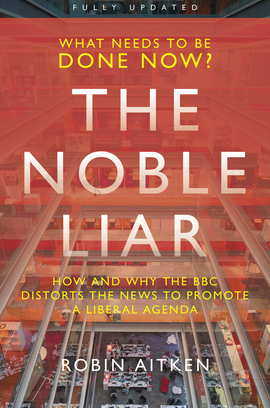 For the second day of the Biteback Book Festival, we're turning our attention to the media. Here to talk us through the BBC and its relationship with coronavirus is author Robin Aitken...
For the second day of the Biteback Book Festival, we're turning our attention to the media. Here to talk us through the BBC and its relationship with coronavirus is author Robin Aitken...
'Public Service Broadcasting' is a phrase that carries with it the whiff of a different era; there's something post-war about it, redolent of a time when the BBC was implicitly trusted to provide the nation with an unimpeachable service. In recent times the BBC has frequently fallen short of that standard but the corona virus pandemic has provided the Corporation with an opportunity to put on display its traditional virtues.
In a time like this, when a fearful population is struggling, collectively, to find the right response to the disease what is required from broadcasters, above all else, is clear, truthful and practical information. People need to know what they must do to keep themselves and their families and neighbours safe. With a few exceptions this is a duty which the BBC has faithfully discharged. Just a few days ago there was a segment on the World at One on Radio 4 on how to make your own face-mask; the fact that this item was preceded by a Ministry of Information announcement dating from 1942 on making face masks only reinforced the sense that Britain is in the process of rediscovering some of the wartime virtues.
Much of the BBC's radio coverage has been exemplary marred only occasionally by an over-aggressive interviewer; one of the female presenters of Today is particularly prone to unnecessary interruptions. Other programmes have shone and Evan Davies' extended PM on Radio 4 has been a master-class in even-tempered, well-informed and intelligent radio. It seems that the BBC has, effortlessly, found the right tone for this crisis. Something which cannot be said of other media outlets; the grandstanding of some big-shot journalists has been emetic.
Auntie, one could say, is having a good Corona War. And one of the intriguing aspects of this is the contrast between the general excellence of the BBC's output in the past three weeks compared to its performance in the preceding three years. Those were years dominated by the Brexit debate and the BBC mislaid the qualities which have distinguished its corona coverage. During Brexit there was a persistent, underlying bias towards the Remain side of the argument. Figures compiled by a media monitoring organisation ( which I detail in the forthcoming new edition of The Noble Liar ) show that throughout the Brexit upheaval there was a large and consistent over-representation of Remainers across all BBC News and Current Affairs output.
The BBC always says it gets criticism from both sides of the argument; but Eurosceptic discontent with the BBC's unbalanced coverage stretches back not merely to 2016 but back into the 1990s. Up until the vote to leave in 2016 Remainers were perfectly content with the way the BBC handled the debate because it was so favourable to their side. In this current health crisis the BBC has rediscovered its ability to talk to the whole country whereas during Brexit one half of the population was left feeling hard done by. If the BBC is wise it will ponder why there was such a difference and learn the necessary lesson; impartiality has to be practised, not merely preached.
Robin's book, The Noble Liar, is published by Biteback and is now available to buy for £7.99 until 26th April. Find out more here!
